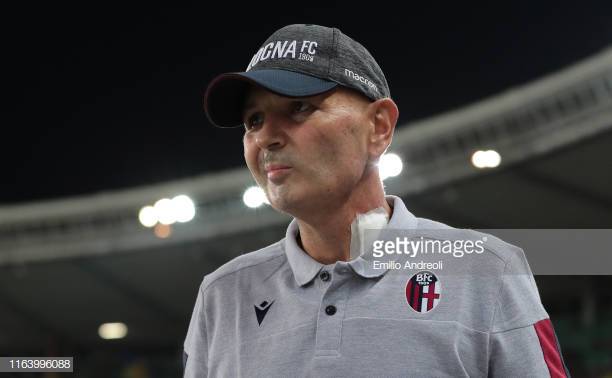Sinisa Mihajlovic is no stranger to fighting. From the fighting that engulfed his homeland, to the fights on the pitch as a player, and fights he’s picked now as a manager, you would be hard-pressed to find someone who considers him weak in any way. But in July he unwittingly began a new battle, against leukaemia. His diagnosis devastated colleagues, players, and fans alike, but in true Mihajlovic fashion, he has faced the battle head-on. And he refused to stop fighting as Bologna FC’s manager, opting to coach from his hospital room as he receives chemotherapy.
Battles in His Homeland
Mihajlovic was born in the former Yugoslavia, in what is now modern-day Vukovar, Croatia. His mother was Croatian, but his father was Serbian. Yugoslavia faced increasing political and economic hardships as Mihajlovic was growing up, and just as his footballing career was taking off, his country was torn apart by ethnic tensions and then by war.
While Mihajlovic was a footballer and didn’t spend much time at home during some of the more difficult times, the war did impact his family. Croatian forces invaded his city and it was actually one of his former friends who destroyed his family home. His parents were captured with the intent to execute them, but the footballer’s phone number was discovered in their things, and he was called to ask if he knew them.
Ironically, it was his ties to a Serbian paramilitary commander and lifelong criminal that saved the lives of his parents. Zeljko Raznatovic, also known as Arkan, was not only that commander, but he was also the leader of Red Star Belgrade’s Ultras, the Delije. Mihajlovic had helped lift both the European Cup and the Intercontinental Cup for Red Star in 1991 and thus was treated as a hero by the notorious Arkan. When Arkan found out that these people were, in fact, the player’s parents, he spared their lives. Mihajlovic’s footballing connections exceeded even the most bitter of nationalistic rivalry, and it literally proved to be life-saving.
Battles on the Pitch
As a player, Mihajlovic began his career in Yugoslavia, most notably playing for Red Star Belgrade. But where he really made a name for himself was in Italy, in Serie A. Playing for both Roma and Lazio, Sampdoria, and Inter Milan, Mihajlovic is still on the record books. He is one of only two people to ever score a hat trick of free kicks in a single game in Serie A, and he scored the most goals from free-kicks in Serie A, scoring 28 goals from free kicks alone in 14 years. He is widely considered to be one of the top five set-piece specialists of all time.
Despite being an exquisite left-footed set-piece specialist, Mihajlovic is equally remembered as a fierce defender who often battled beyond the parameters of the Laws of the Game. For example, many remember the Champions League encounter between Lazio and Arsenal in October of 2000, as Mihajlovic was suspended two matches for racially abusing Patrick Viera. The Lazio defender confessed and later apologized for his indiscretions, while Viera, who also racially abused Mihajlovic, was never punished. But it was certainly not the only time the Serbian let his temper get the best of him.
Perhaps more infamous was his encounter with Adrian Mutu during the Chelsea-Lazio match in the Champions League in 2003. Ahead of eventually being sent off for a second yellow, Mihajlovic spat on Mutu and appeared to have tried to kick him, too. He received a whopping eight-match European suspension from UEFA for his attack on Mutu.
The Serbian defender later became a tactician, and seven years later, he became the manager of Fiorentina, where Mutu ironically was a player. Mihajlovic has said that as a player, he was always more motivated and effective if he had an “enemy” on the other side. Many would say that he intentionally tried to make enemies, but Mutu would tell you that Mihajlovic was the first to apologize and extend the olive branch when he arrived at Fiorentina. Mihajlovic would battle fiercely on the pitch but put all grievances aside outside of the game.
Battles on the Bench
Not surprisingly, Mihajlovic brought the same fighting spirit as a tactician as he had always had as a player. He began as an assistant to Roberto Mancini at Inter Milan, where he had ended his playing career. From there he has managed Bologna, Catania, Fiorentina, Sampdoria, AC Milan, and Torino in Serie A. He also managed the Serbian national team.
While he has been sent off as a manager, usually for curse words or kicking water bottles and the like, his best-known battle was as the manager for Serbia. He had a very strict set of rules that he held his players to, as discipline was a big weakness of this squad. He had also coached Adem Ljajic at Fiorentina, so it surprised everyone when Mihajlovic cut Ljajic, one of Serbia’s most talented players at the time because the player refused to sing the Serbian national anthem. This battle is largely believed to have his eventual downfall as the manager for Serbia, but Mihajlovic did not change his stance.
Battling for His Life
On July 13th, the Bologna manager held a press conference to announce that he had been diagnosed with a very aggressive form of leukaemia, called acute myeloid leukaemia, or AML. Having lost his own father to cancer, the tactician had been receiving regular testing as a precaution. His tests at the end of February were all clear, but although he was completely symptom-free, these tests in July were positive for leukaemia.
The fierce “bad boy” former footballer-turned-manager admitted that he cried for the first few days, but he still asked to stay on as Bologna’s manager. He talked about his new battle in the language he knows best: football. “I explained to them that we have to attack and plan to win. If we sit back and try to defend, we'll get knocked down straight away. I have to use my tactics in this battle and I’m sure, without any doubts, that I will win this battle.”
His first three-week treatment was abruptly interrupted when he returned to the stadium from his hospital bed to coach Bologna’s season opener against Hellas Verona. Even his players were surprised to see him, as he had been coaching from the hospital via video and other communications up through that very day. His doctor said he was a model patient, wearing a mask when asked to do so due to the risks of an immune system weakened by his treatments. He was released from the hospital last week and was also able to be on the bench for Bologna’s 1-0 win over SPAL on Friday.
Mihajlovic has a reputation as an undisciplined tough guy, and he definitely didn't win every match as a player or a coach, but it never stopped him from fighting. This new battle proves to be his biggest yet, as he has indicated he wants to win the battle against AML for his wife and five children, amongst others. Although he caught it very early, his case is considered very aggressive. However, he is not asking for sympathy, that has never been his style. He closed his press conference with the message of a warrior: “I hope that after I've won this battle, I will be able to talk it over with all of you and look back at this time. Unfortunately, nothing was given to me in life. I had to fight for everything. I will fight this too.










































